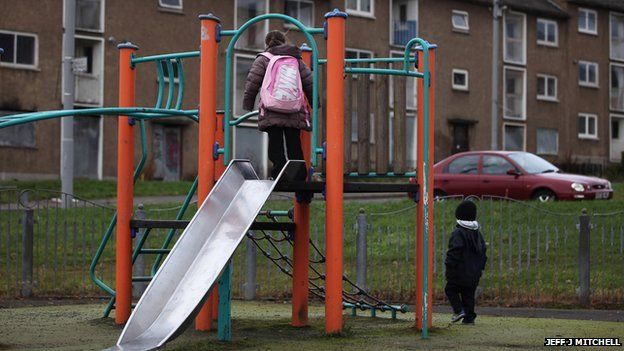Children's centres need more funding, says Barnardo's
- Published

Support for vulnerable children in England is at risk as funding ebbs away, according to a charity's analysis of government figures.
Money allocated to children's centres, which provide services to families, has fallen by 35% in five years, according to new calculations by Barnardo's.
The charity wants the government to ensure councils have the funding "to prioritise these important services".
The government said councils had a duty to meet the needs of local families.
Researchers for the charity analysed the education spending of every local authority in England and figures from the Department for Education.
Overall, they calculate that expenditure on children's centres declined from £1.2bn in 2010-11 to an estimated £740m in 2014-15.
'Good, low-key help'
"The evidence is stark: children's centre funding has been leaking away year after year, leading to the closure or merging of hundreds of these lifeline services across England," the charity concludes.
Local authorities are having to make tough decisions as their budgets are reduced, says the charity.
England currently has a network of about 2,800 children's centres, of which Barnardo's runs 190, providing a range of services.
These include general drop-in sessions and classes for children and their families as well as specialist help for more vulnerable families, for example counselling or learning support.
"Children's centres are a really good, low-key way of engaging with families and stepping in with support where it's needed," said a Barnardo's spokeswoman.
The charity fears funding cuts could see services which are particularly vital to disadvantaged children "dwindling away".
Free childcare
It backs the government's promise to provide 30 hours of free childcare every week to all three- and four-year-olds, but says that without the wider support provided by children's centres, the poorest will still lag behind their wealthier peers.
"Cuts to basic early support now will only result in in increased costs in the future " said chief executive Javed Khan.
"Without the vital support of children's centres to the poorest children and families, we are simply neglecting the seeds of more costly problems later in the shape of troubled families, crime, substance abuse and unemployment.
"Investing in the UK's children's centres simply makes sense - not only are we investing in our children, we are investing in our future."
A Department for Education spokeswoman said recent research showed record numbers of children were now using the centres.
"We want to see a strong network of children's centres in place across the country, offering families access to a wide range of local, flexible services, tackling disadvantage and preparing children for life in modern Britain.
"Councils have a duty to ensure sufficient children's centres to meet local need and to ensure they consult before any significant changes are made, including taking into account the views of local families and communities.
"Local councils are best placed to decide on provision in their communities. Since 2010, we have increased funding for early intervention to £2.4bn to help them meet local need."
The Local Government Association, which represents councils in England, said the past five years had seen about a 40% reduction in the overall amount central government provides for children's services.
"This has had consequences for children's centres and other services councils provide," said David Simmonds, chairman of the LGA's Children and Young People Board.
"We welcome the fact that more children and families are using children's centres but at a time when budgets are stretched there are limits to what can be achieved when councils are having to serve more families and children with less money."
- Published22 April 2015
- Published27 February 2015
- Published28 January 2015
- Published14 January 2011